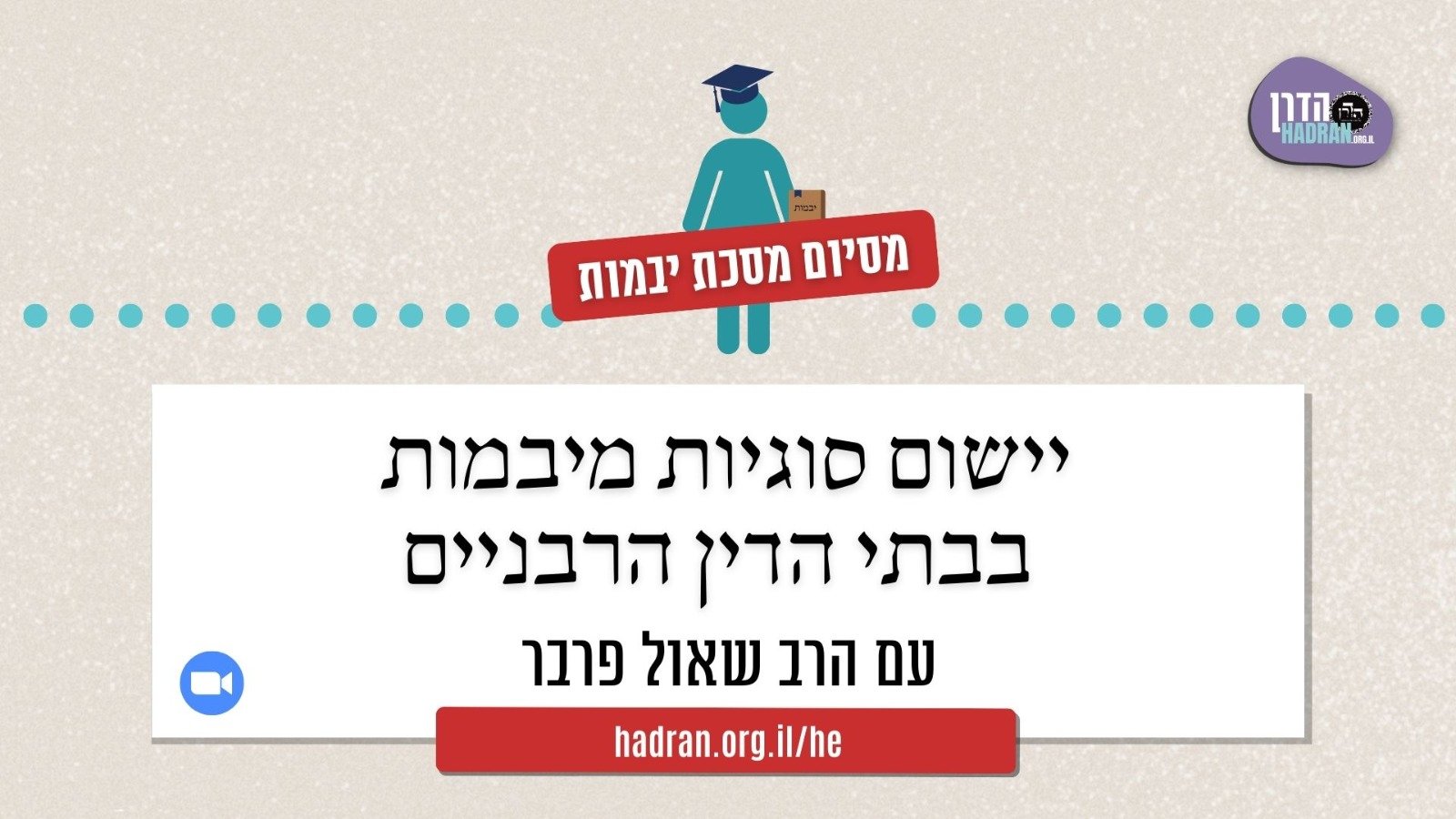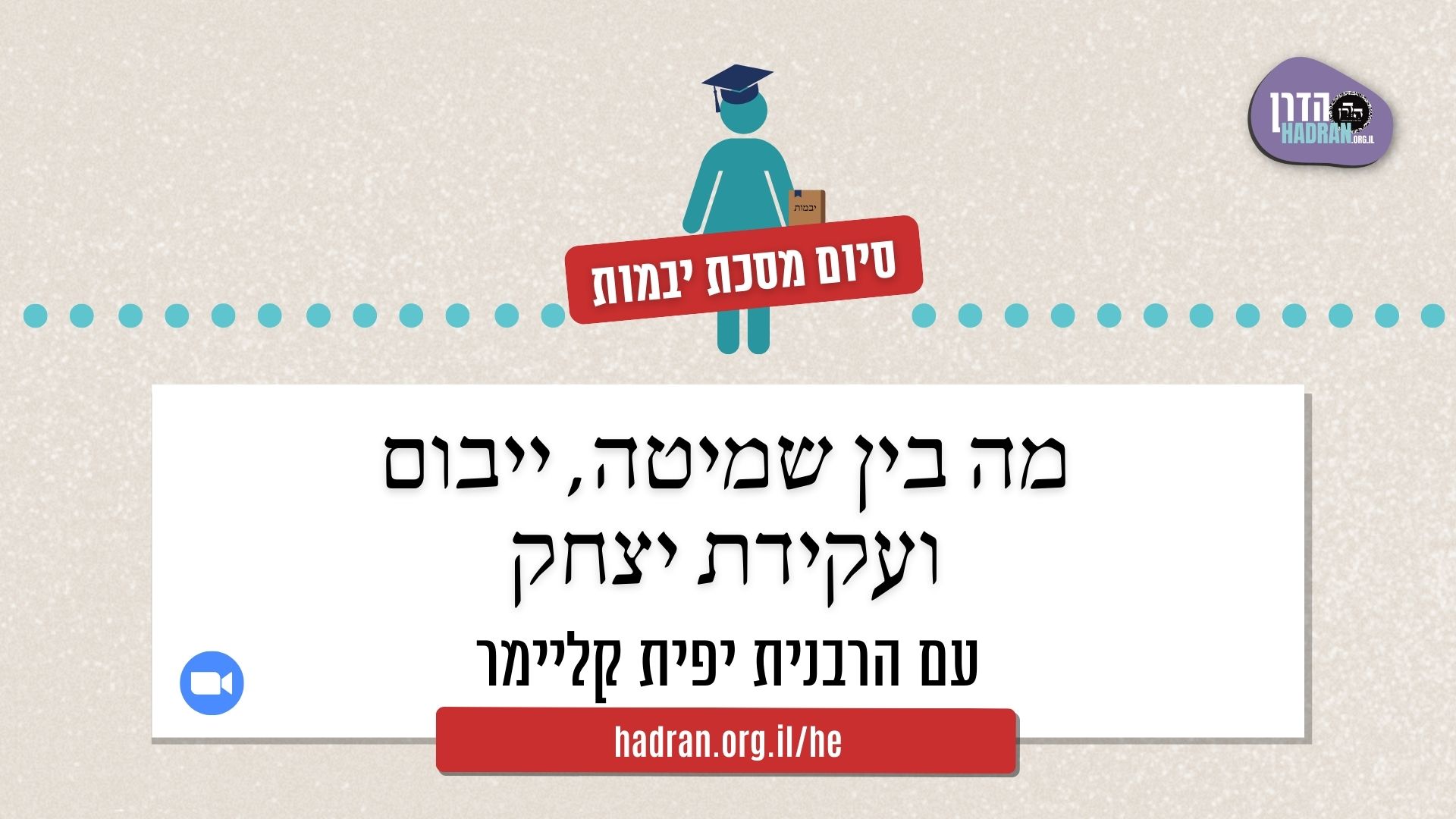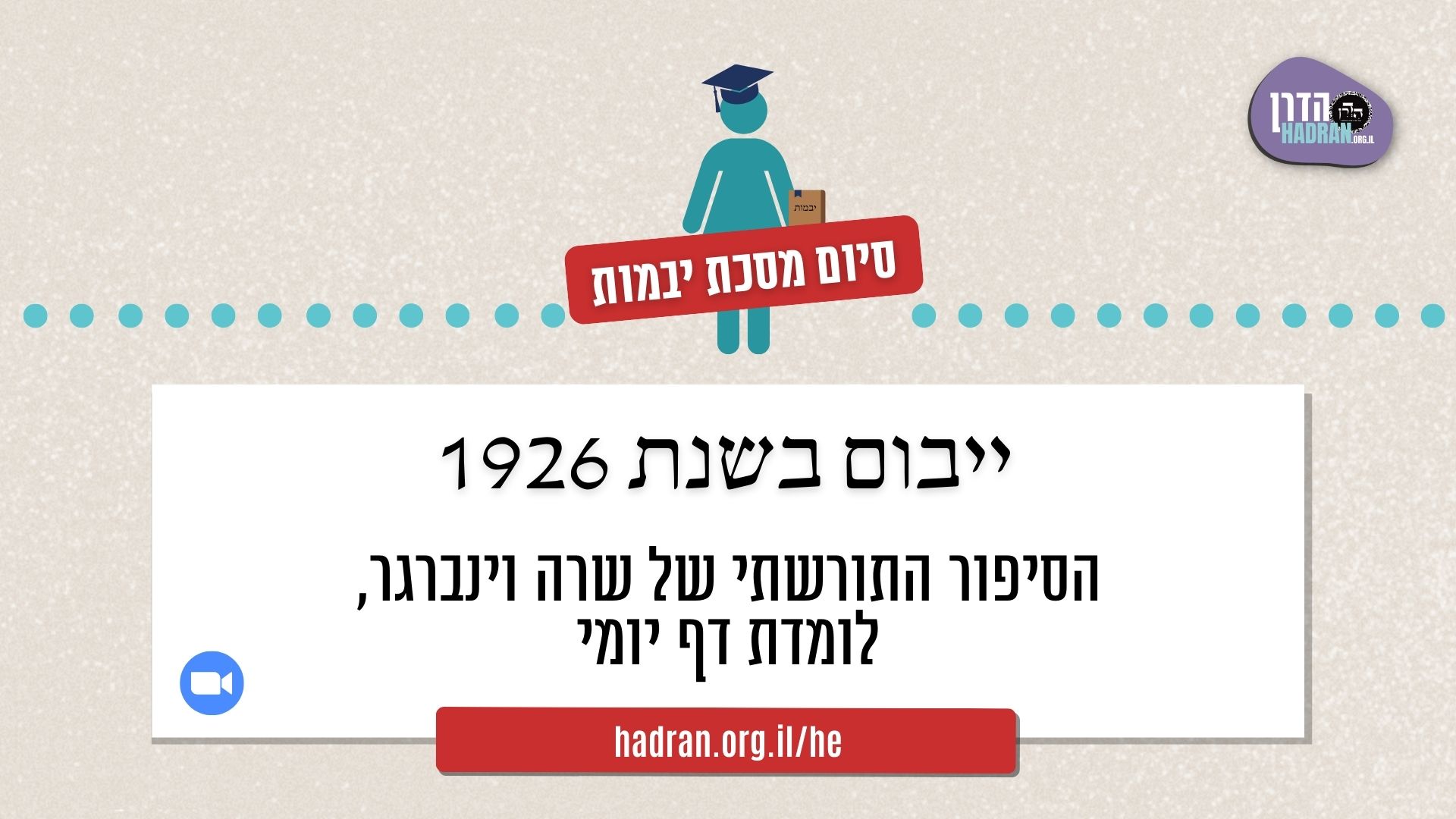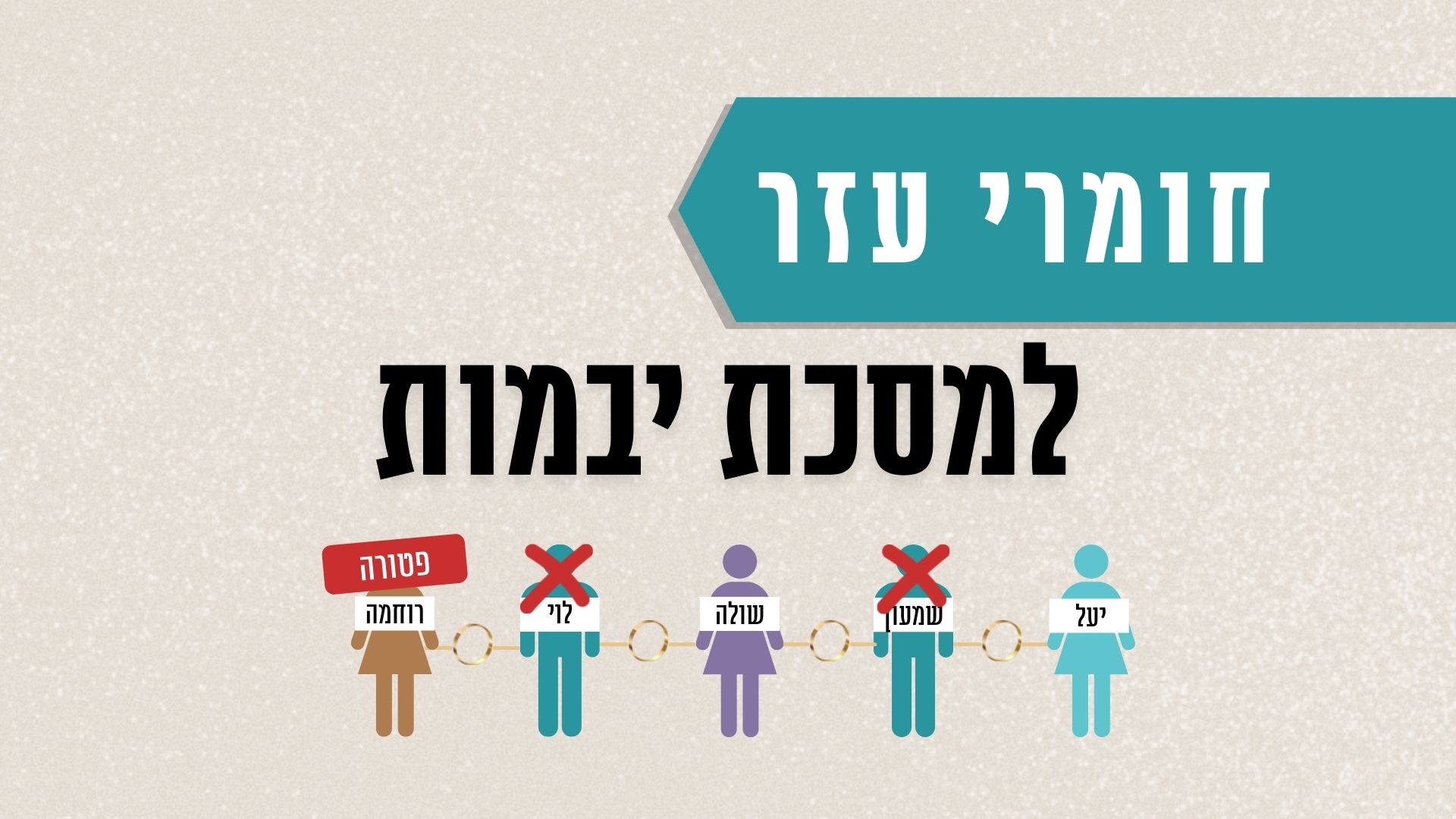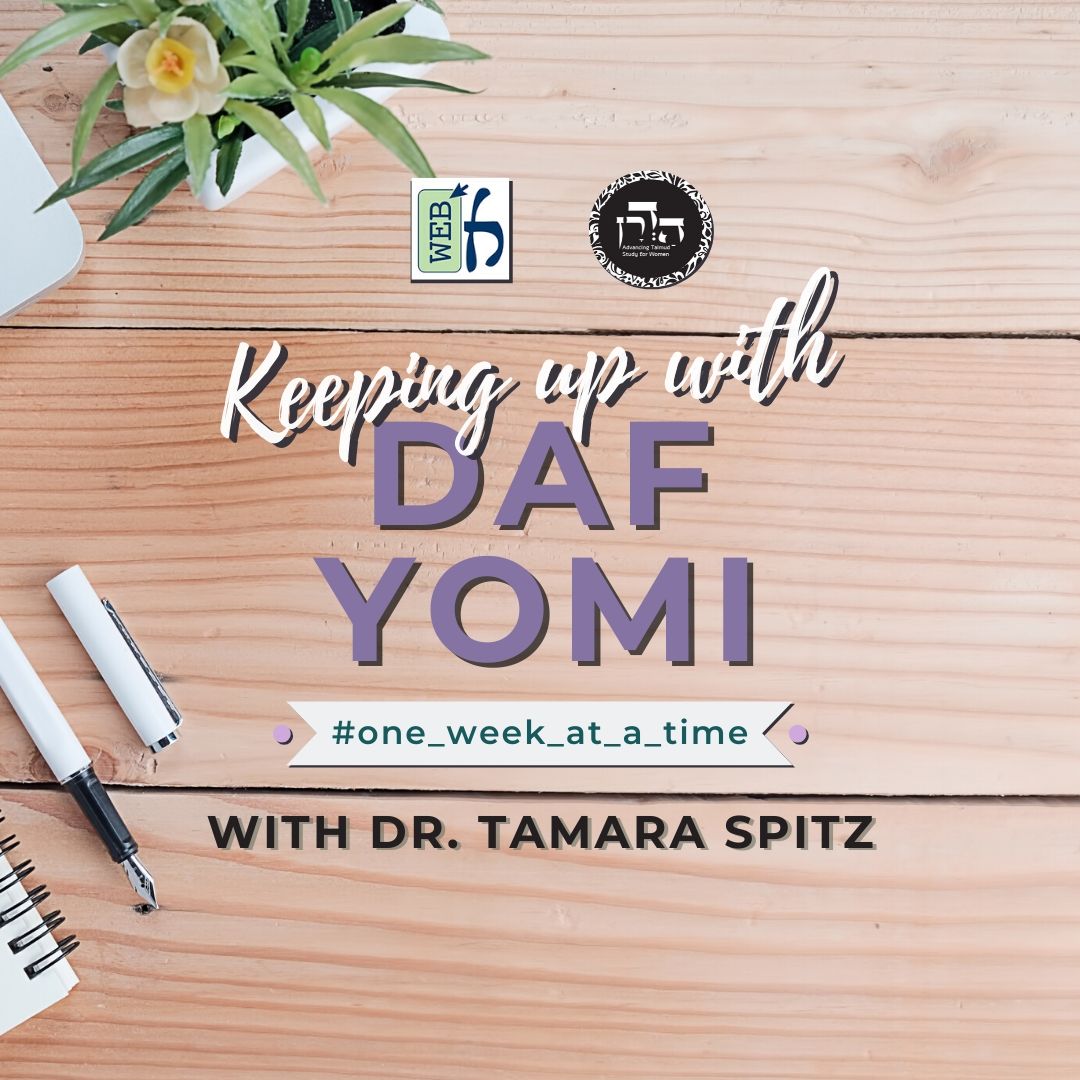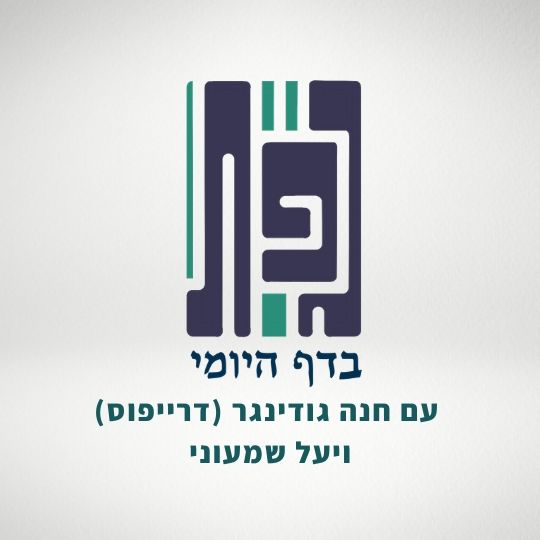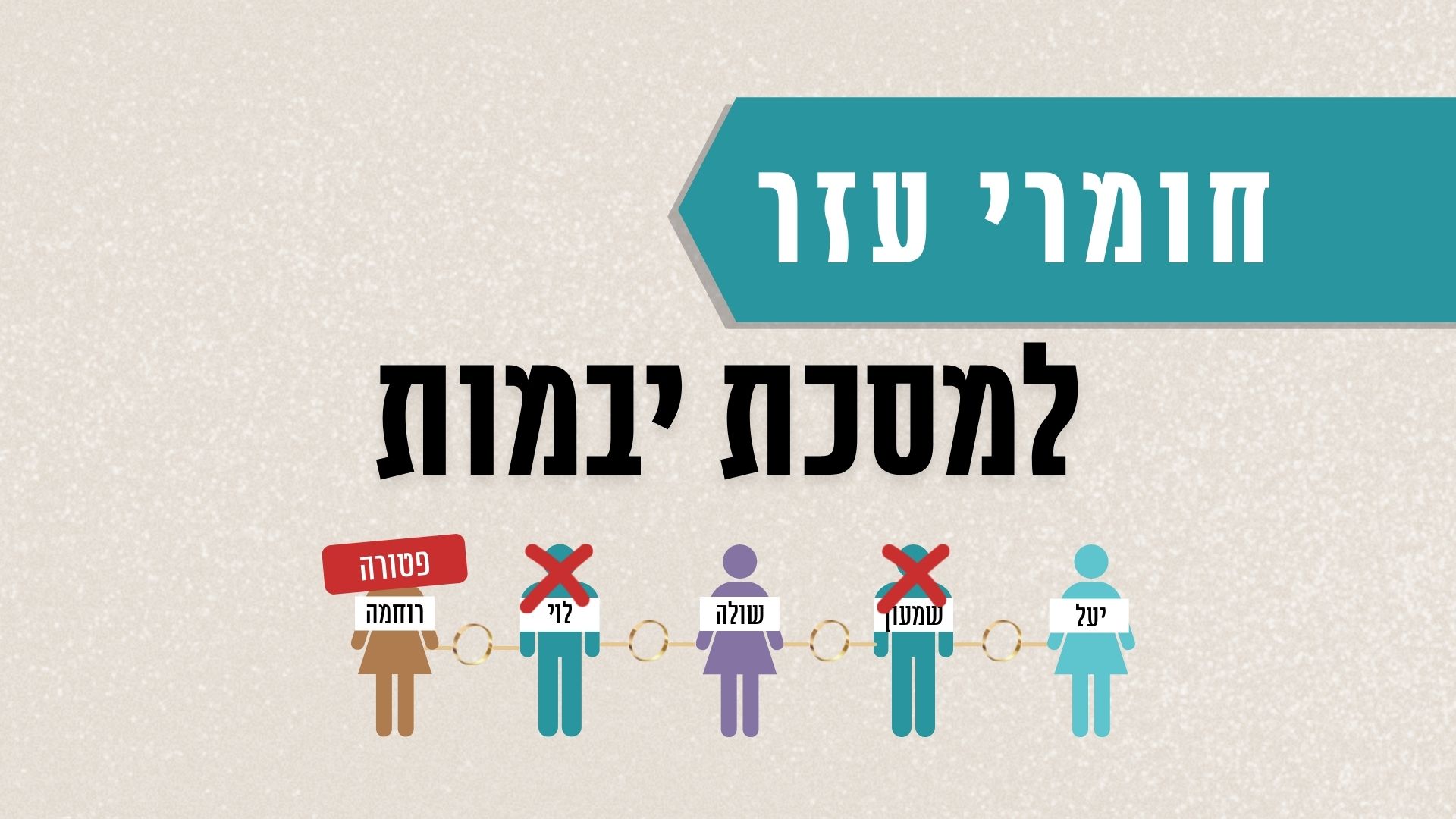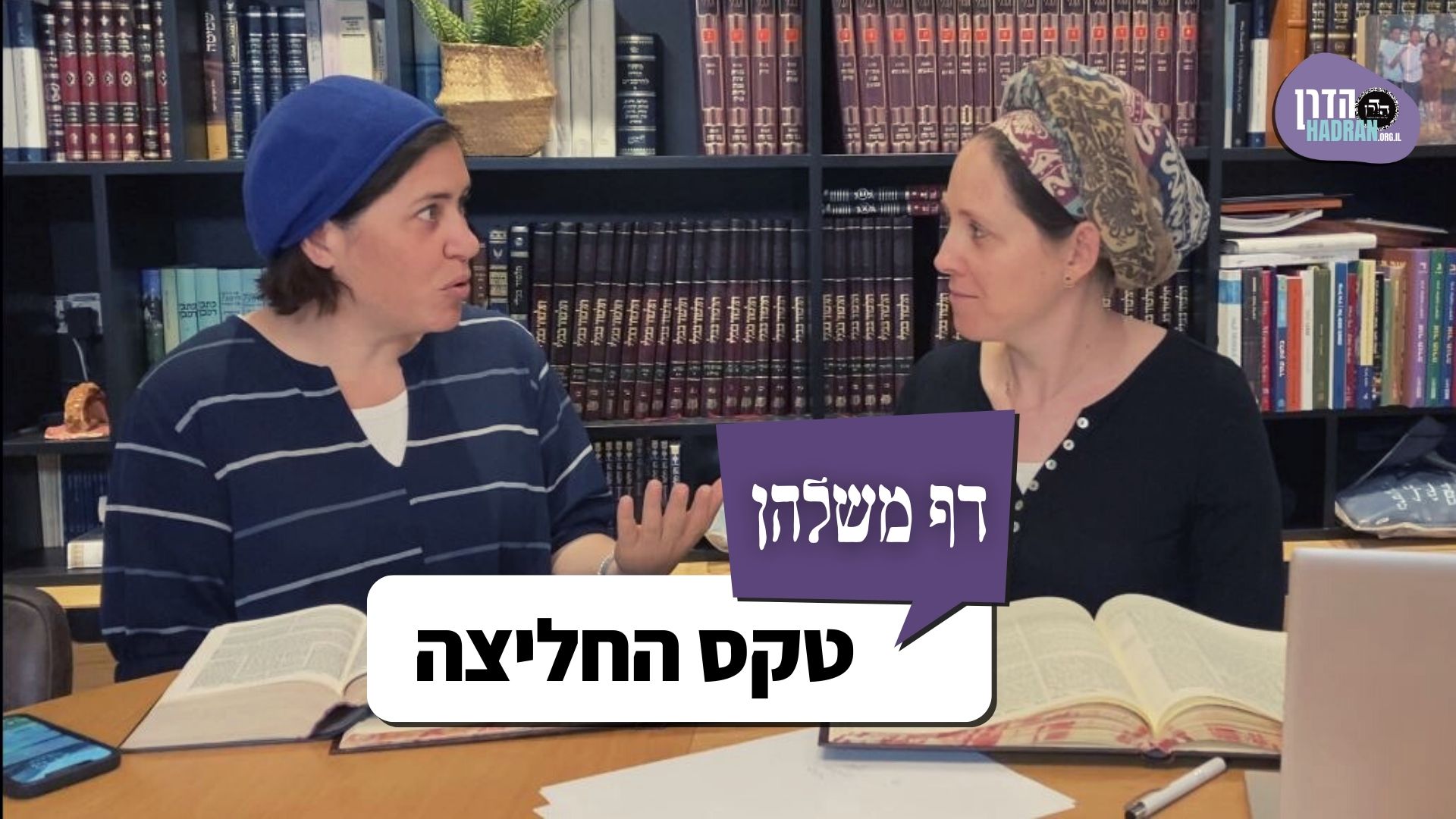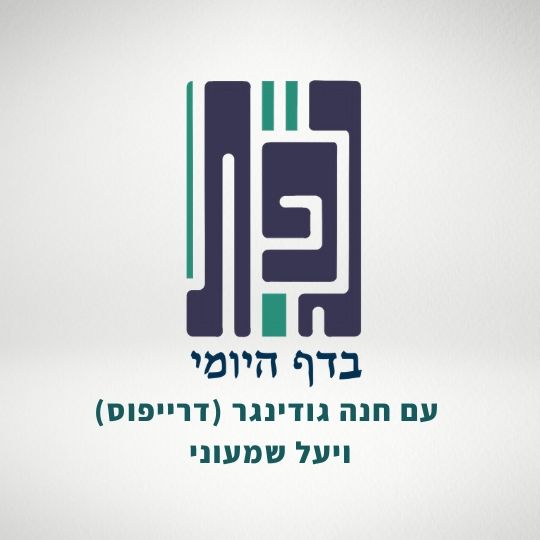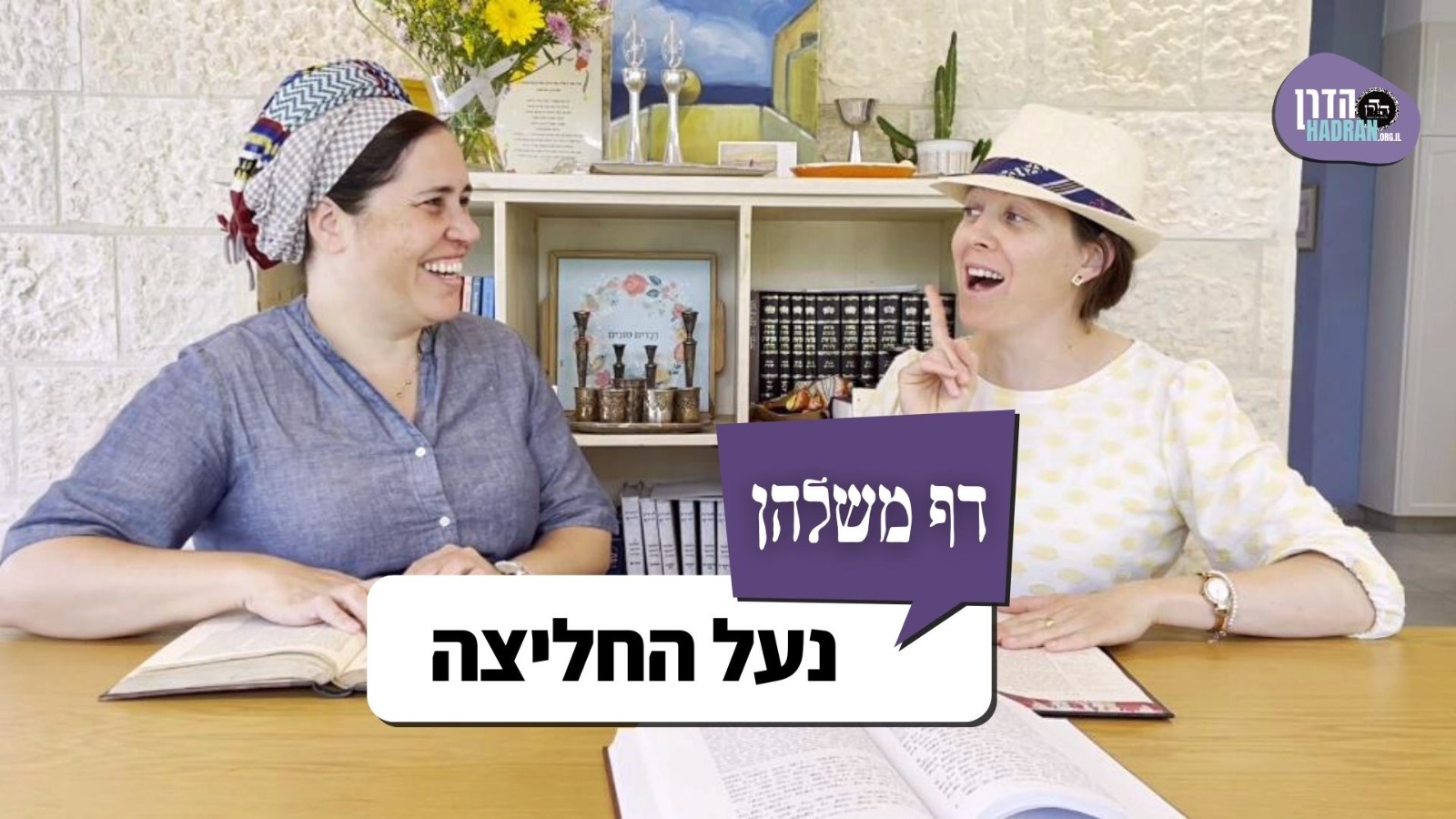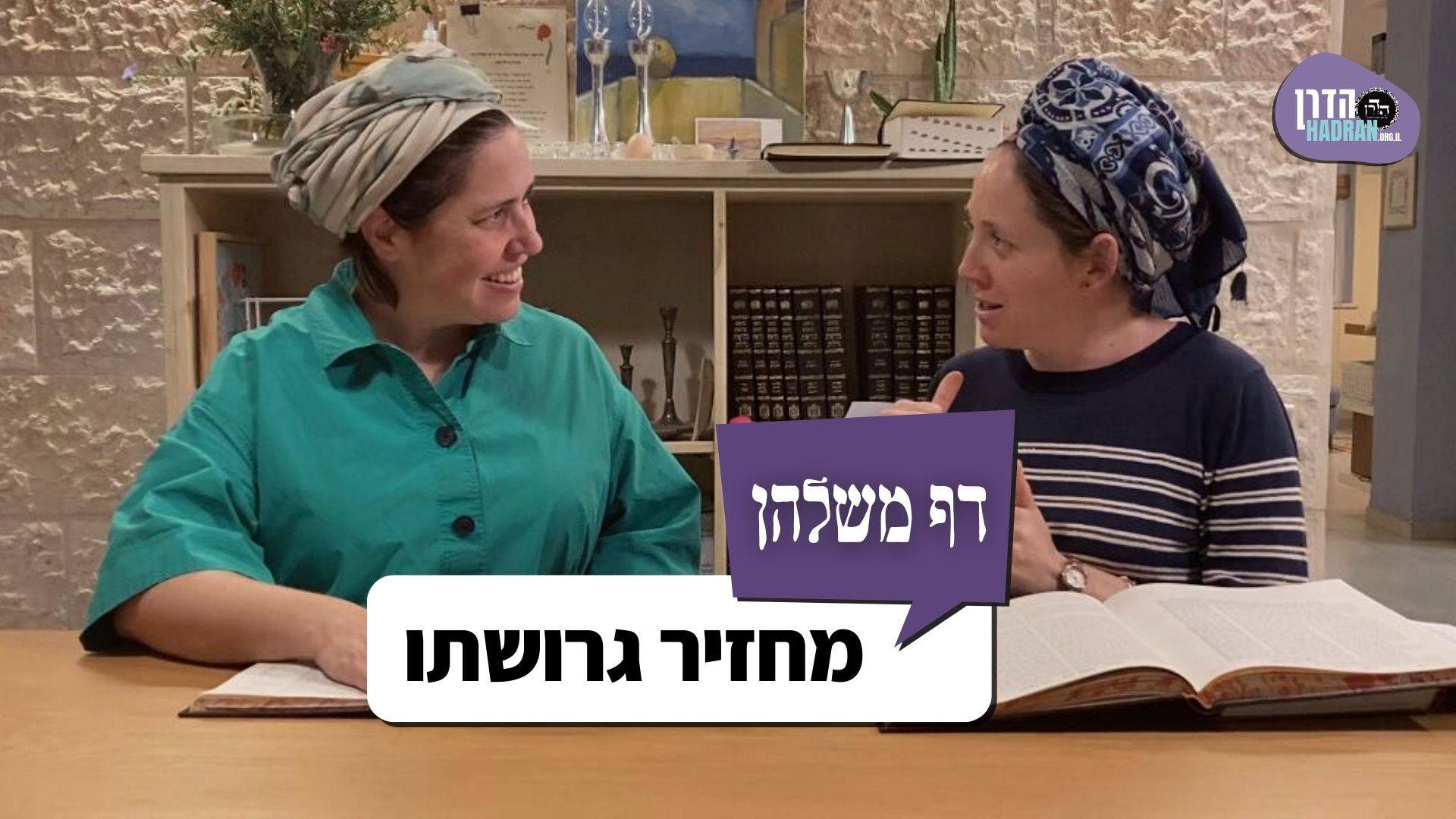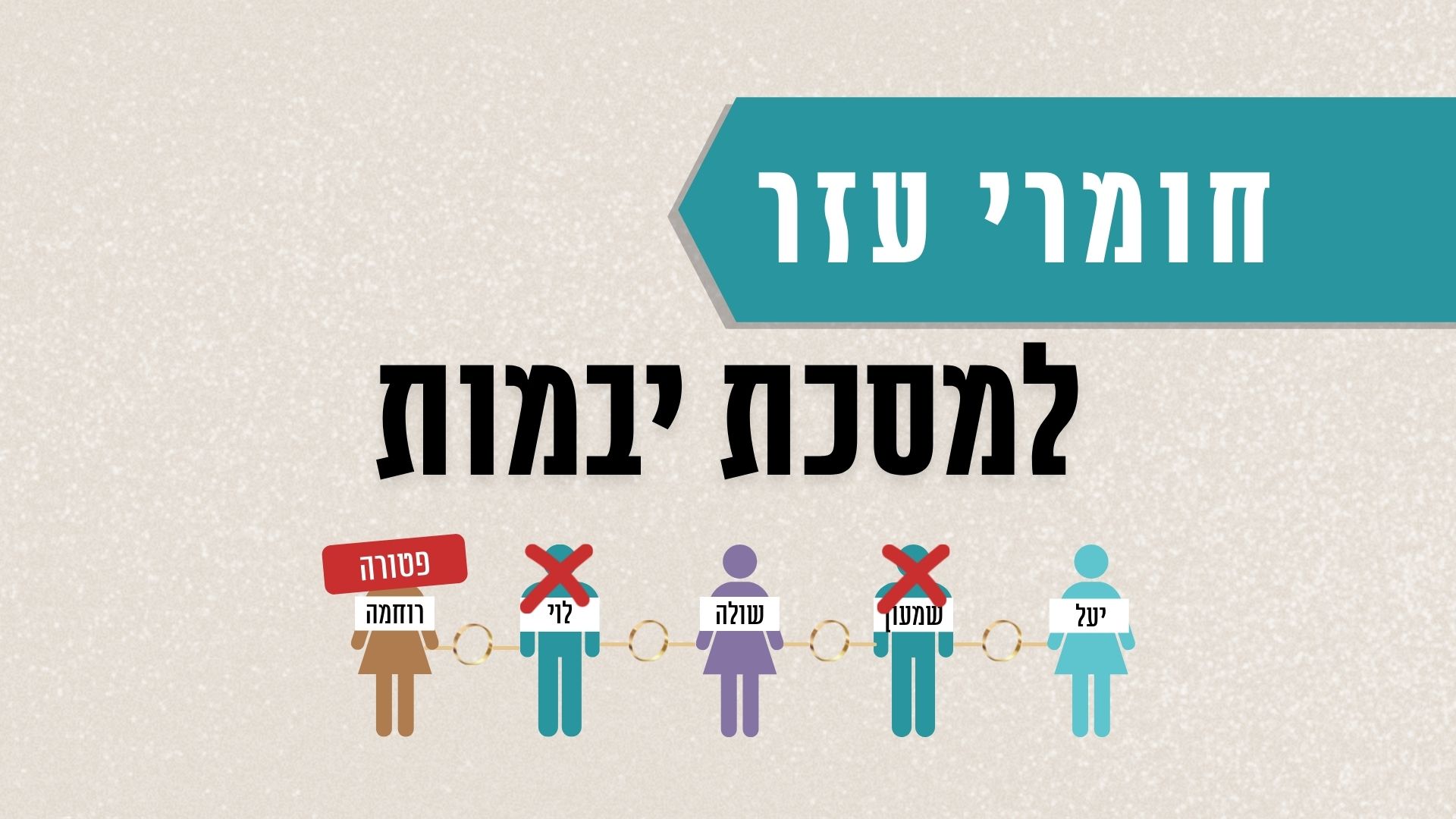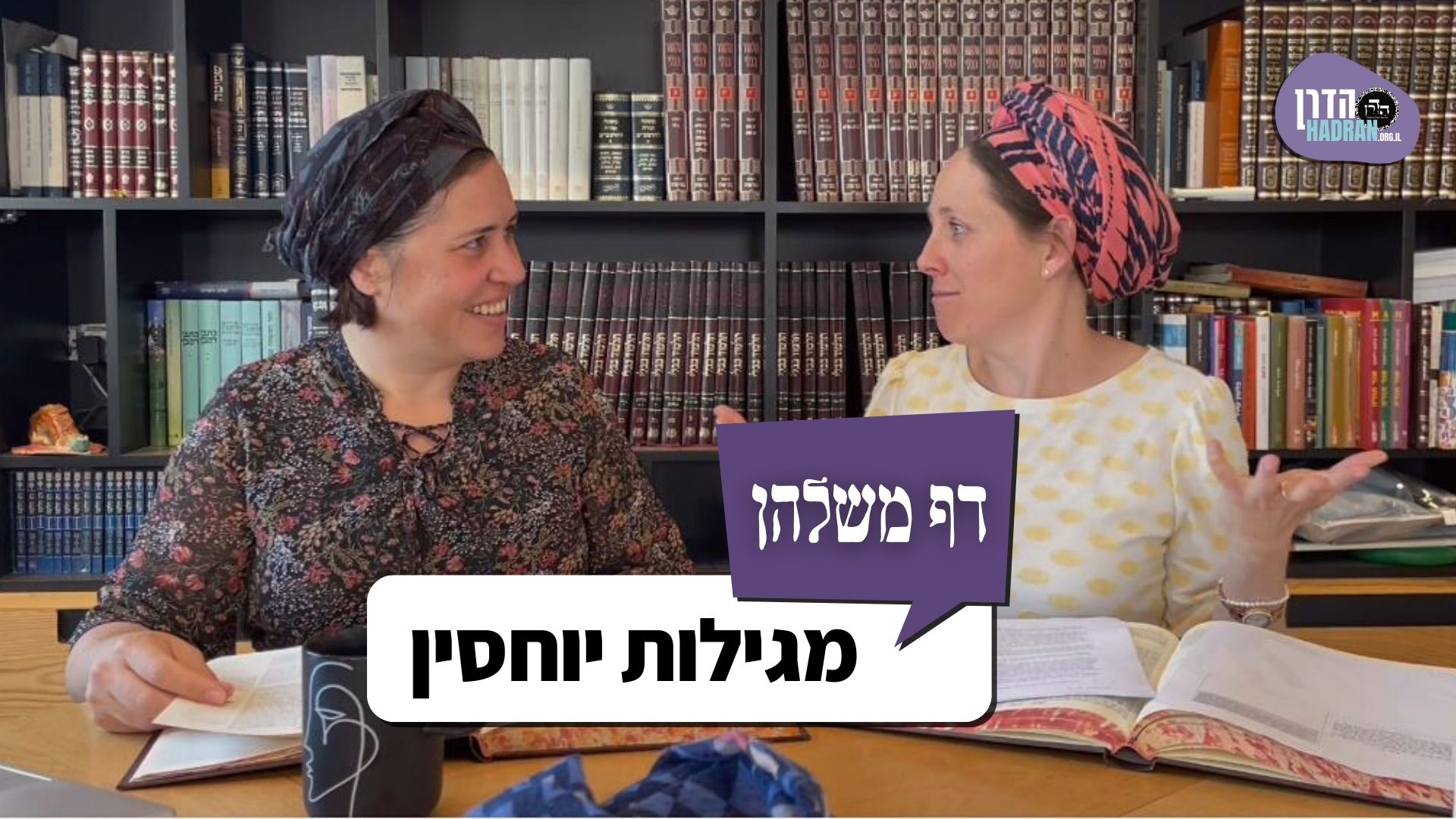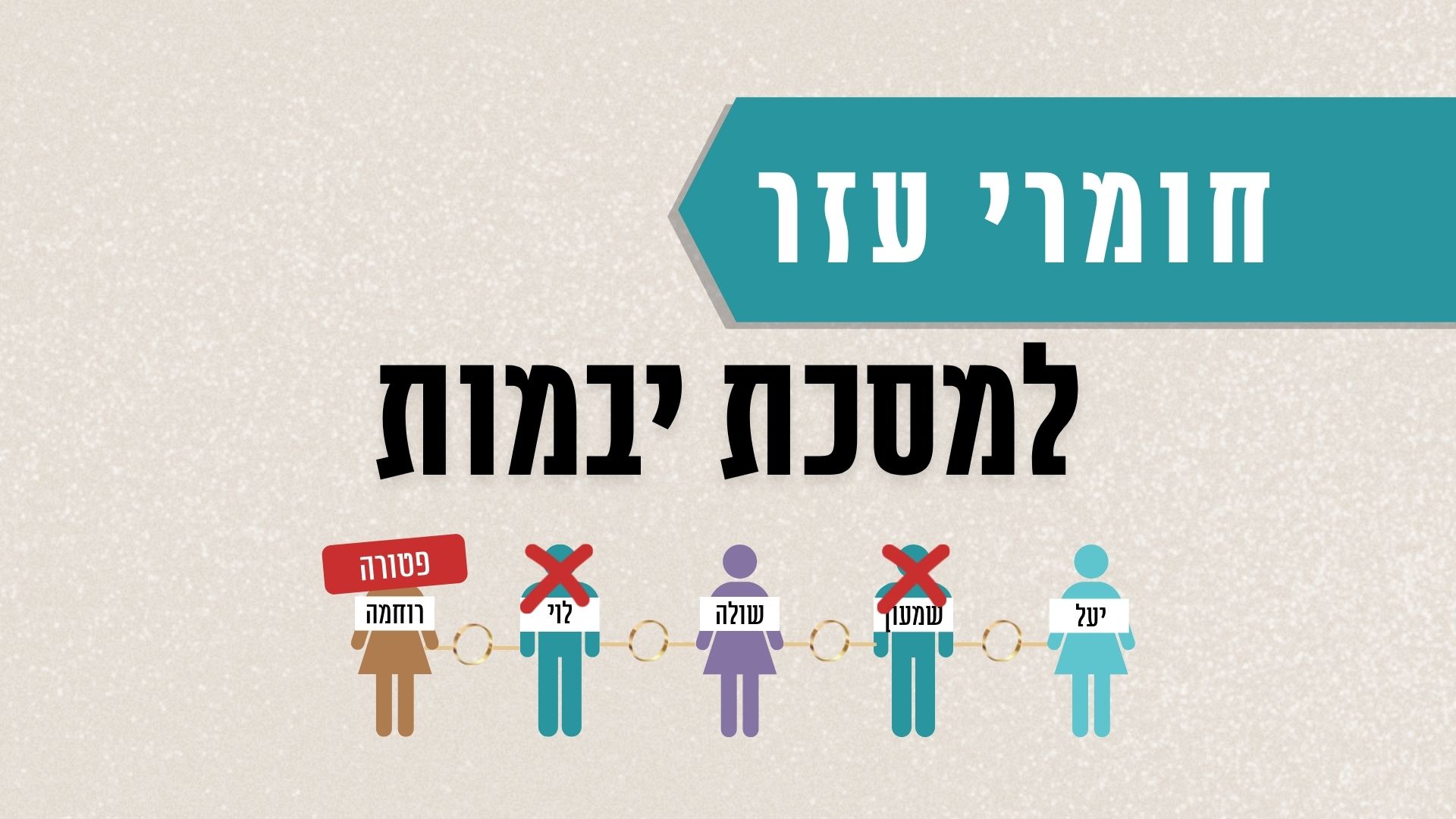יבמות קכא
קֵירַב מִיתָתוֹ. מַאי בֵּינַיְיהוּ?
hastened his own death. For instance, if the maimed man convulsed intensely, injuring himself, the perpetrator is not culpable for the death and should not be exiled. The Gemara asks: What is the practical difference between these two considerations, that the wind or the victim himself hastened his death?
דְּשַׁחְטֵיהּ בְּבֵיתָא דְשֵׁישָׁא וּפַרְכֵּיס. אִי נָמֵי: דְּשַׁחְטֵיהּ בְּבָרָא וְלָא פַּרְכֵּיס.
The Gemara explains: There is a practical difference between them in a case where one cut someone in a house of marble that was closed on every side, in which there was no wind, and the victim convulsed. Alternatively, there is a difference in a case where one cut the victim outside, where there is wind, and the victim did not convulse at all.
רַבִּי יְהוּדָה אוֹמֵר: לֹא כָּל וְכוּ׳. אִיבַּעְיָא לְהוּ: רַבִּי יְהוּדָה בֶּן בָּבָא לְקוּלָּא פְּלִיג, אוֹ לְחוּמְרָא פְּלִיג.
§ It was taught in the mishna that one may testify to someone’s death only when he saw the corpse within three days of the individual’s death. However, Rabbi Yehuda ben Bava says: Not every person, nor every place, nor every hour is identical. A dilemma was raised before the Sages: Did Rabbi Yehuda ben Bava disagree with the Rabbis with the intent to rule more leniently and hold that sometimes one may testify to the identity of one who died even if he did not see the body within three days of his death? Or, did he disagree with the intent to rule more stringently and hold that sometimes one may not testify even if he saw the body within three days of the individual’s death?
תָּא שְׁמַע: דְּהָהוּא גַּבְרָא דְּטָבַע בְּכַרְמֵי, וְאַסְּקוּהוּ אַבֵּי הֲדָיָא לְבָתַר תְּלָתָא יוֹמִין, וְאַנְסְבַהּ רַב דִּימִי מִנְּהַרְדְּעָא לִדְבֵיתְהוּ. וְתוּ: הָהוּא גַּבְרָא דִּאטְבַע בְּדִגְלַת, וְאַסְּקוּהוּ אַגִּישְׁרָא דְּשַׁבִּיסְתָּנָא, וְאַנְסְבַהּ רָבָא לִדְבֵיתְהוּ אַפּוּמָּא דְשׁוֹשְׁבִינֵי לְבָתַר חַמְשָׁה יוֹמֵי.
Come and hear a solution: A certain man drowned in a place called Carmi, and they drew him out of the water near Bei Hedya after three days, and Rav Dimi from Neharde’a allowed his wife to marry. And furthermore, a certain man drowned in the Tigris River, and they drew him out of the river onto the Bridge of Shabistana, and Rava allowed his wife to marry based upon his friends’ testimony, although the body was seen only five days after death.
אִי אָמְרַתְּ בִּשְׁלָמָא לְקוּלָּא פְּלִיג, אִינְהוּ דַּעֲבוּד כְּרַבִּי יְהוּדָה בֶּן בָּבָא. אֶלָּא אִי אָמְרַתְּ לְחוּמְרָא פְּלִיג, אִינְהוּ דַּעֲבוּד כְּמַאן? שָׁאנֵי מַיָּא, דְּצָמְתִי.
Granted, if you say Rabbi Yehuda ben Bava disagreed with the intent to rule more leniently, these Sages who acted here, allowing these women to marry, acted in accordance with the opinion of Rabbi Yehuda ben Bava. But if you say he disagreed with the intent to rule more stringently, in accordance with whose opinion did these Sages act? The Gemara answers: Water is different, since it contracts the body, preventing it from bloating and changing shape.
וְהָאָמְרַתְּ מַיָּא מַרְזוּ מַכָּה! הָנֵי מִילֵּי הֵיכָא דְּאִיכָּא מַכָּה, אֲבָל הֵיכָא דְּלֵיכָּא מַכָּה — מִיצְמָת צָמֵית. וְהָנֵי מִילֵּי דְּכִי אַסְּקֵיהּ חַזְיֵיהּ בְּשַׁעְתֵּיהּ. אֲבָל אִישְׁתַּהִי, מִיתְפָּח תָּפַח.
The Gemara wonders about this: But didn’t you say (120b) that water aggravates a wound by causing additional swelling? The Gemara answers: This applies when there is a wound, but when there is no wound, the water contracts the body and thereby prevents the shape of the face from changing. The Gemara comments: And this applies only in a case where they drew him out of the water and viewed him at that time. But if the viewing was delayed for some time after the body was drawn from the water, it certainly will have become very bloated, making it impossible to positively identify.
מַתְנִי׳ נָפַל לְמַיִם, בֵּין שֶׁיֵּשׁ לָהֶן סוֹף, בֵּין שֶׁאֵין לָהֶן סוֹף — אִשְׁתּוֹ אֲסוּרָה. אָמַר רַבִּי מֵאִיר: מַעֲשֶׂה בְּאֶחָד שֶׁנָּפַל לְבוֹר הַגָּדוֹל, וְעָלָה לְאַחַר שְׁלֹשָׁה יָמִים.
MISHNA: If a man fell into the water and did not come out, whether the body of water has a visible end or does not have a visible end, his wife is prohibited from remarrying. There is no absolute proof that the man died, as it is possible that he emerged from the water some distance away. Rabbi Meir said: An incident occurred involving a certain person who fell into the Great Cistern and emerged only after three days. This is evidence that sometimes one may survive a fall into water, even when everyone assumes he is dead.
אָמַר רַבִּי יוֹסֵי: מַעֲשֶׂה בְּסוֹמֵא שֶׁיָּרַד לִטְבּוֹל בִּמְעָרָה, וְיָרַד מוֹשְׁכוֹ אַחֲרָיו, וְשָׁהוּ כְּדֵי שֶׁתֵּצֵא נַפְשָׁם — וְהִשִּׂיאוּ אֶת נְשׁוֹתֵיהֶם. וְשׁוּב מַעֲשֶׂה בְּעַסְיָא, בְּאֶחָד שֶׁשִּׁלְשְׁלוּהוּ לַיָּם, וְלֹא עָלְתָה בְּיָדָם אֶלָּא רַגְלוֹ, אָמְרוּ חֲכָמִים: מִן הָאַרְכּוּבָּה וּלְמַעְלָה — תִּנָּשֵׂא. מִן הָאַרְכּוּבָּה וּלְמַטָּה — לֹא תִּנָּשֵׂא.
Rabbi Yosei said: An incident occurred involving a blind man who descended to immerse for ritual purity in a cave, and his guide descended after him, and they disappeared there, and they remained there long enough for their souls to have departed, and the Sages permitted their wives to marry because they had disappeared into the water and not emerged. And there was another incident in Asya in which they lowered a certain man into the sea on a rope, and when they pulled the rope back to land only his leg came up in their hands, and they were not certain whether he was alive or dead. The Sages said: If his leg was cut from the knee and above, his wife may marry, as he did not survive such a wound; if his leg was cut only from the knee and below, she may not marry.
גְּמָ׳ תָּנוּ רַבָּנַן: נָפַל לַמַּיִם, בֵּין שֶׁיֵּשׁ לָהֶם סוֹף, בֵּין שֶׁאֵין לָהֶם סוֹף — אִשְׁתּוֹ אֲסוּרָה, דִּבְרֵי רַבִּי מֵאִיר. וַחֲכָמִים אוֹמְרִים: מַיִם שֶׁיֵּשׁ לָהֶם סוֹף — אִשְׁתּוֹ מוּתֶּרֶת, וְשֶׁאֵין לָהֶם סוֹף — אִשְׁתּוֹ אֲסוּרָה.
GEMARA: The Sages taught: If a man fell into the water, whether the body of water has a visible end or does not have a visible end, his wife is prohibited from marrying; this is the statement of Rabbi Meir. And the Rabbis say: If he fell into a body of water with a visible end, his wife is permitted to marry, but if he fell into a body of water with no end, his wife is prohibited from marrying.
הֵיכִי דָּמֵי מַיִם שֶׁיֵּשׁ לָהֶם סוֹף? אָמַר אַבָּיֵי: כֹּל שֶׁעוֹמֵד וְרוֹאֶה מֵאַרְבַּע רוּחוֹתָיו.
The Gemara asks: What are the circumstances defining a body of water with a visible end? Abaye said: Any body of water where one stands in one place and can see the shore in all four directions is considered water with a visible end, since anyone emerging from the water would be seen. However, if the body of water is so large that it is impossible to see its shore on all sides, the individual may have emerged at a place where he could not be seen by others standing at the place where he fell in.
הָהוּא גַּבְרָא דִּטְבַע בְּאַגְמָא דְסַמְקֵי, אַנְסְבַהּ רַב שֵׁילָא לִדְבֵיתְהוּ. אֲמַר לֵיהּ רַב לִשְׁמוּאֵל, תָּא נְשַׁמְּתֵיהּ. אֲמַר לֵיהּ: נִשְׁלַח לֵיהּ בְּרֵישָׁא.
There was a certain man who drowned in the lake in a place called Samkei. Rav Sheila allowed his wife to marry based on the testimony of witnesses who saw that he entered the water and did not emerge. Rav said to Shmuel: Come, let us excommunicate him for having issued this ruling. Shmuel said to him: Let us first send him a message and clarify whether he had a sufficient reason to issue this ruling.
שְׁלַחוּ לֵיהּ: מַיִם שֶׁאֵין לָהֶם סוֹף, אִשְׁתּוֹ אֲסוּרָה אוֹ מוּתֶּרֶת? שְׁלַח לְהוּ: אִשְׁתּוֹ אֲסוּרָה. וְאַגְמָא דְסַמְקֵי — מַיִם שֶׁיֵּשׁ לָהֶם סוֹף, אוֹ מַיִם שֶׁאֵין לָהֶם סוֹף? שְׁלַח לְהוּ: מַיִם שֶׁאֵין לָהֶם סוֹף הוּא. וּמָר, מַאי טַעְמָא עֲבַד הָכִי?
They sent him the following question: When a man disappears in an endless body of water, is his wife a forbidden or a permitted woman, i.e., may she remarry? He sent back to them: His wife is forbidden. They asked him further: Is the lake of Samkei a body of water with a visible end or an endless body of water? He sent a response to them: It is an endless body of water, since one cannot see the water’s edge on every side. They then asked him: If so, what is the reason that the Master, i.e., Rav Sheila, acted this way, allowing the wife to remarry?
מִיטְעָא טְעֵינָא, אֲנָא סְבַרִי כֵּיוָן דִּקְווּ וְקָיְימִי — כְּמַיִם שֶׁיֵּשׁ לָהֶם סוֹף דָּמֵי, וְלָא הִיא: כֵּיוָן דְּאִיכָּא גַּלֵּי — אֵימוֹר גַּלֵּי אַשְׁפְּלוּ[הּ].
He answered them: I erred in my reasoning. I thought: Since the waters are gathered and stagnant and not flowing like a river, they are considered as a body of water with a visible end. But that is not so. Since there are waves in this body of water, say that the waves carried him away from our sight, allowing him to emerge without being seen.
קָרֵי שְׁמוּאֵל עֲלֵיהּ דְּרַב: ״לֹא יְאוּנֶּה לַצַּדִּיק כׇּל אָוֶן״. קָרֵי רַב עֲלֵיהּ דִּשְׁמוּאֵל: ״וּתְשׁוּעָה בְּרוֹב יוֹעֵץ״.
In light of this response, Shmuel recited this verse about Rav: “No mischief shall befall the righteous” (Proverbs 12:21). Since the righteous Rav waited and did not excommunicate Rav Sheila, he was prevented from causing him injustice. Rav Sheila had been mistaken and had not intentionally violated the decree of the Sages prohibiting a woman from remarrying on the basis of her husband having disappeared into an endless body of water. Rav recited this verse about Shmuel: “But salvation lies in much counsel” (Proverbs 11:14), since it was Shmuel’s advice that caused Rav to wait.
תַּנְיָא, אָמַר רַבִּי: מַעֲשֶׂה בִּשְׁנֵי בְּנֵי אָדָם מְכַמְּרִין מִכְמוֹרִין בַּיַּרְדֵּן, וְנִכְנַס אֶחָד מֵהֶם לִמְחִילָּה שֶׁל דָּגִים, וְשָׁקְעָה חַמָּה וְלֹא רָאָה פִּתְחָהּ שֶׁל מְחִילָּה, וְשָׁהָה חֲבֵרוֹ כְּדֵי שֶׁתֵּצֵא נַפְשׁוֹ, וּבָא וְהוֹדִיעַ בְּתוֹךְ בֵּיתוֹ. לְמָחָר, זָרְחָה חַמָּה וְהִכִּיר פִּתְחָהּ שֶׁל מְחִילָּה, וּבָא וּמָצָא הֶסְפֵּד גָּדוֹל בְּתוֹךְ בֵּיתוֹ. אָמַר רַבִּי: כַּמָּה גְּדוֹלִים דִּבְרֵי חֲכָמִים, שֶׁאָמְרוּ: מַיִם שֶׁיֵּשׁ לָהֶם סוֹף — אִשְׁתּוֹ מוּתֶּרֶת, שֶׁאֵין לָהֶם סוֹף — אִשְׁתּוֹ אֲסוּרָה.
It is taught in a baraita that Rabbi Yehuda HaNasi said: An incident occurred involving two people who were fishing with nets on the Jordan River, and one of them entered a cave containing a pond of fish next to the shore. Meanwhile, the sun set and the one who had entered the cave could not see the cave’s opening and did not exit, so his friend thought he had drowned. His friend waited long enough for his soul to have departed and came and notified the man’s household that he had drowned. The following day the sun rose, and the man in the cave recognized the opening of the cave and exited through it. And he came and found profuse eulogizing in his house. Rabbi Yehuda HaNasi said about this: How great are the words of the Sages, who said: If a man fell into a body of water with a visible end, his wife is permitted to marry, but in a case of water with no end, his wife is prohibited from marrying.
אִי הָכִי, מַיִם שֶׁיֵּשׁ לָהֶם סוֹף נָמֵי, לֵיחוּשׁ לִמְחִילָּה שֶׁל דָּגִים! בְּמַיִם שֶׁיֵּשׁ לָהֶם סוֹף מְחִילָּה שֶׁל דָּגִים לָא שְׁכִיחָא.
The Gemara asks: If so, even in the case of a body of water with a visible end, let us also be concerned about a cave containing a pond of fish. Even if the individual did not emerge for a long period of time, it is possible that he entered a cave and is still alive. The Gemara answers: A cave containing a pond of fish is not common in a body of water with a visible end.
אָמַר רַב אָשֵׁי: הָא דַּאֲמַרוּ רַבָּנַן מַיִם שֶׁאֵין לָהֶם סוֹף אִשְׁתּוֹ אֲסוּרָה — הָנֵי מִילֵּי בְּאִינִישׁ דְּעָלְמָא, אֲבָל צוּרְבָּא מֵרַבָּנַן — לָא. אִי דִּסְלֵיק — קָלָא אִית לֵיהּ. וְלָא הִיא: לָא שְׁנָא אִינִישׁ דְּעָלְמָא, וְלָא שְׁנָא צוּרְבָּא מֵרַבָּנַן, דִּיעֲבַד — אִין, לְכַתְּחִלָּה — לָא.
Rav Ashi said: That which the Sages said, that if a man fell into an endless body of water, his wife is prohibited from remarrying, applies only to an ordinary person who is not well known and could slip away secretly and live in anonymity, hiding the fact that he survived. But it does not apply to a Torah scholar, because if he would emerge from the water, publicity would be generated and the news of his survival would spread. The Gemara rejects this: That is not so. It is no different for an ordinary man and it is no different for a Torah scholar. After the fact, i.e., if she remarried, yes, she may remain with her new husband, but she may not remarry ab initio.
תַּנְיָא, אָמַר רַבָּן גַּמְלִיאֵל: פַּעַם אַחַת הָיִיתִי מְהַלֵּךְ בִּסְפִינָה, וְרָאִיתִי סְפִינָה אַחַת שֶׁנִּשְׁבְּרָה. וְהָיִיתִי מִצְטַעֵר עַל תַּלְמִיד חָכָם שֶׁבָּהּ, וּמַנּוּ — רַבִּי עֲקִיבָא. וּכְשֶׁעָלִיתִי בַּיַּבָּשָׁה, בָּא וְיָשַׁב וְדָן לְפָנַי בַּהֲלָכָה. אָמַרְתִּי לוֹ: בְּנִי, מִי הֶעֶלְךָ? אָמַר לִי: דַּף שֶׁל סְפִינָה נִזְדַּמֵּן לִי, וְכׇל גַּל וְגַל שֶׁבָּא עָלַי — נִעְנַעְתִּי לוֹ רֹאשִׁי.
§ It is taught in a baraita: Rabban Gamliel said: Once I was traveling on a boat, and from a distance I saw a boat that shattered and sank. And I was grieved over the apparent death of the Torah scholar who was on board. And who was it? Rabbi Akiva. But when I disembarked onto dry land, he came, and sat, and deliberated before me about halakha. I said to him: My son, who brought you up from the water? He said to me: A plank from the boat came to me, and I bent my head before each and every wave that came toward me. The waves did not wash me off of the board, and I reached the shore.
מִכָּאן אָמְרוּ חֲכָמִים: אִם יָבוֹאוּ רְשָׁעִים עַל אָדָם — יְנַעְנֵעַ לוֹ רֹאשׁוֹ. אָמַרְתִּי בְּאוֹתָהּ שָׁעָה: כַּמָּה גְּדוֹלִים דִּבְרֵי חֲכָמִים, שֶׁאָמְרוּ: מַיִם שֶׁיֵּשׁ לָהֶם סוֹף — מוּתֶּרֶת, מַיִם שֶׁאֵין לָהֶם סוֹף — אֲסוּרָה.
From here the Sages stated: If wicked people come upon a person, he should bend his head before them. That is, he should temporarily restrain himself and not fight them, and he will therefore be saved. After this parenthetical statement, the Gemara returns to Rabban Gamliel’s story. I said at that moment: How great are the words of the Sages, who said: If a man fell into a body of water with a visible end, his wife is permitted to remarry. But in a case of an endless body of water, his wife is prohibited from remarrying.
תַּנְיָא, אָמַר רַבִּי עֲקִיבָא: פַּעַם אַחַת הָיִיתִי מְהַלֵּךְ בִּסְפִינָה, וְרָאִיתִי סְפִינָה אַחַת שֶׁמִּטָּרֶפֶת בַּיָּם, וְהָיִיתִי מִצְטַעֵר עַל תַּלְמִיד חָכָם שֶׁבָּהּ, וּמַנּוּ — רַבִּי מֵאִיר. כְּשֶׁעָלִיתִי לִמְדִינַת קַפּוֹטְקְיָא, בָּא וְיָשַׁב וְדָן לְפָנַי בַּהֲלָכָה. אָמַרְתִּי לוֹ: בְּנִי, מִי הֶעֶלְךָ? אָמַר לִי: גַּל טְרָדַנִי לַחֲבֵרוֹ, וַחֲבֵרוֹ לַחֲבֵרוֹ, עַד שֶׁהֱקִיאַנִי לַיַּבָּשָׁה. אָמַרְתִּי בְּאוֹתָהּ שָׁעָה: כַּמָּה גְּדוֹלִים דִּבְרֵי חֲכָמִים, שֶׁאָמְרוּ: מַיִם שֶׁיֵּשׁ לָהֶם סוֹף — אִשְׁתּוֹ מוּתֶּרֶת, מַיִם שֶׁאֵין לָהֶם סוֹף — אִשְׁתּוֹ אֲסוּרָה.
It is taught in a baraita: Rabbi Akiva said: Once I was traveling on a boat, and I saw a certain boat sinking at sea, and I was grieved over the apparent death of the Torah scholar who was on board. And who was it? Rabbi Meir. But when I disembarked at the province of Cappadocia, he came, and sat, and deliberated before me about halakha. I said to him: My son, who brought you up from the water? He said to me: One wave carried me to another, and that other wave to another, until I reached the shore, and a wave cast me up onto dry land. I said at that moment: How great are the words of the Sages, who said: If a man fell into a body of water with a visible end, his wife is permitted to remarry. But in a case of an endless body of water, his wife is prohibited from remarrying.
תָּנוּ רַבָּנַן: נָפַל לְגוֹב אֲרָיוֹת — אֵין מְעִידִין עָלָיו. לַחֲפוּרָה מְלֵאָה נְחָשִׁים וְעַקְרַבִּים — מְעִידִין עָלָיו. רַבִּי יְהוּדָה בֶּן בְּתֵירָא אוֹמֵר: אַף לַחֲפוּרָה מְלֵאָה נְחָשִׁים וְעַקְרַבִּים אֵין מְעִידִין עָלָיו, חָיְישִׁינַן
§ The Sages taught: If an individual fell into a lion’s den, one may not testify about him that he died, since the lions might not have killed him. If he fell into a pit filled with snakes and scorpions, one may testify about his death, since it is certain that they killed him. Rabbi Yehuda ben Beteira says: Even if he fell into a pit filled with snakes and scorpions, one may not testify about him that he died, because we are concerned
שֶׁמָּא חַבָּר הוּא. וְתַנָּא קַמָּא, אַגַּב אִיצְצָא מַזְּקִי לֵיהּ.
that perhaps he is a charmer [ḥabbar] of snakes and scorpions who knows magic or some stratagem to keep them from harming him. And the first tanna holds that we need not be concerned about this possibility, as, due to the pressure of his body falling on top of them, they will harm him, even if he could control them under other circumstances.
תָּנוּ רַבָּנַן: נָפַל לְתוֹךְ כִּבְשַׁן הָאֵשׁ — מְעִידִין עָלָיו. לְיוֹרָה מְלֵאָה יַיִן וָשֶׁמֶן — מְעִידִין עָלָיו. מִשּׁוּם רַבִּי אַחָא אָמְרוּ: שֶׁל שֶׁמֶן — מְעִידִין עָלָיו, מִפְּנֵי שֶׁהוּא מַבְעִיר. שֶׁל יַיִן — אֵין מְעִידִין עָלָיו, מִפְּנֵי שֶׁהוּא מְכַבֶּה. אָמְרוּ לוֹ: תְּחִלָּתוֹ מְכַבֶּה וְסוֹפוֹ מַבְעִיר.
The Sages taught: If one fell into a blazing furnace, one may testify about him that he has died. If he fell into a boiling cauldron filled with wine or oil, one may also testify about him that he has died. In the name of Rabbi Aḥa, they said: If he fell into a cauldron of oil, one may testify about him that he has died, because this ignites the fire even more. Through the force of his fall, oil will splash into the fire and increase the heat of the cauldron. However, if he fell into a cauldron of wine, one may not testify about him that he has died, because when wine splashes into the fire it extinguishes the fire. They said to him: At first it partially extinguishes the fire but eventually it ignites it even more, and therefore it can be assumed that he has died.
אָמַר רַבִּי מֵאִיר: מַעֲשֶׂה בְּאֶחָד שֶׁנָּפַל לַבּוֹר הַגָּדוֹל וְכוּ׳. תַּנְיָא, אָמְרוּ לוֹ לְרַבִּי מֵאִיר: אֵין מַזְכִּירִין מַעֲשֵׂה נִסִּים. מַאי מַעֲשֵׂה נִסִּים? אִילֵּימָא דְּלָא אֲכַל וְלָא אִישְׁתִּי — וְהָכְתִיב: ״וְצוּמוּ עָלַי וְאַל תֹּאכְלוּ וְאַל תִּשְׁתּוּ״.
§ The mishna stated that Rabbi Meir said: An incident occurred involving a certain individual who fell into the Great Cistern and emerged after three days. It is taught in a baraita: They said to Rabbi Meir: One does not mention miraculous acts to teach general halakha. The Gemara asks: What about that story defines it as an example of miraculous acts? If we say the fact that he did not eat or drink for three days and still survived is miraculous, but isn’t it written: “Fast for me, and neither eat nor drink three days, night or day” (Esther 4:16), demonstrating that one may survive this experience naturally?
אֶלָּא דְּלָא נָיֵים. דְּאָמַר רַבִּי יוֹחָנָן: שְׁבוּעָה שֶׁלֹּא אִישַׁן שְׁלֹשָׁה יָמִים — מַלְקִין אוֹתוֹ, וְיִישַׁן לְאַלְתַּר.
The Gemara answers: Rather, the miraculous element is that he did not sleep during those three days, as Rabbi Yoḥanan said: If one says: I hereby take on an oath that I will not sleep for three days, the court flogs him for taking an oath in vain, and he may sleep immediately because it is impossible to remain awake for three consecutive days.
וְרַבִּי מֵאִיר מַאי טַעְמָא? אָמַר רַב כָּהֲנָא: כִּיפִּין עַל גַּב כִּיפִּין הֲווֹ. וְרַבָּנַן — דְּשֵׁישָׁא הֲווֹ. וְרַבִּי מֵאִיר: אִי אֶפְשָׁר דְּלָא מְסָרֵיךְ וְנָיֵים פּוּרְתָּא.
The Gemara asks: And according to Rabbi Meir, what is the reason this was not a miraculous incident? The Gemara answers that Rav Kahana said: There were several levels of arches built on top of other arches within the Great Cistern, and he supported himself on the arches and slept. And the Rabbis said that they were made of marble and it was impossible to hold onto them and sleep. And Rabbi Meir assumed that it is inconceivable that he didn’t grasp some part of an arch for a short time and sleep a little, and therefore this incident does not qualify as a miracle.
תָּנוּ רַבָּנַן: מַעֲשֶׂה בְּבִתּוֹ שֶׁל נְחוּנְיָא חוֹפֵר שִׁיחִין שֶׁנָּפְלָה לְבוֹר הַגָּדוֹל, וּבָאוּ וְהוֹדִיעוּ לְרַבִּי חֲנִינָא בֶּן דּוֹסָא. שָׁעָה רִאשׁוֹנָה, אָמַר לָהֶם: שָׁלוֹם. שְׁנִיָּה, אָמַר לָהֶם: שָׁלוֹם. שְׁלִישִׁית, אָמַר לָהֶם: עָלְתָה.
The Sages taught: An incident occurred involving the daughter of Neḥunya the well digger, who fell into the Great Cistern, and they came and notified Rabbi Ḥanina ben Dosa and asked that he pray for her. After the first hour, he said to them: She is at peace and unharmed. After the second hour, he said to them: She is at peace. After the third hour he said to them: She has ascended from the cistern.
אָמַר לָהּ: בִּתִּי, מִי הֶעֱלֵךְ? אָמְרָה לוֹ: זָכָר שֶׁל רְחֵלִים נִזְדַּמֵּן לִי, וְזָקֵן מַנְהִיגוֹ. אָמְרוּ לוֹ: נָבִיא אַתָּה? אָמַר לָהֶם: ״לֹא נָבִיא אָנֹכִי וְלֹא בֶּן נָבִיא אָנֹכִי״, אֶלָּא: דָּבָר שֶׁהַצַּדִּיק מִתְעַסֵּק בּוֹ — יִכָּשֵׁל בּוֹ זַרְעוֹ?
When she came to Rabbi Ḥanina ben Dosa, he said to her: My daughter, who pulled you up from the cistern? She said to him: A male sheep, i.e., a ram, happened by and sensed me in that cistern, and there was an old man leading him who pulled me out. They said to Rabbi Ḥanina ben Dosa: Are you a prophet with knowledge of what is happening far away? He said to them, using a figure of speech from the Bible: “I am not a prophet, nor the son of a prophet am I” (Amos 7:14). Rather, I reasoned as follows: Could it be that concerning the endeavor that the righteous Neḥunya is engaged in, i.e., digging for the benefit of the public, his offspring would stumble upon its fruits and thereby be killed? I therefore knew that God would certainly save her.
אָמַר רַבִּי אַבָּא: אַף עַל פִּי כֵן מֵת בְּנוֹ בַּצָּמָא, שֶׁנֶּאֱמַר: ״וּסְבִיבָיו נִשְׂעֲרָה מְאֹד״, מְלַמֵּד שֶׁהַקָּדוֹשׁ בָּרוּךְ הוּא מְדַקְדֵּק עִם סְבִיבָיו כְּחוּט הַשַּׂעֲרָה. רַבִּי חֲנִינָא אָמַר, מֵהָכָא: ״אֵל נַעֲרָץ בְּסוֹד קְדוֹשִׁים רַבָּה וְנוֹרָא עַל כׇּל סְבִיבָיו״.
Rabbi Abba said: Even so, the son of Neḥunya the well digger died of thirst, and the merit of his father, who attended to the water supply, did not protect him, as is stated: “And around Him it storms [nisara] mightily” (Psalms 50:3), which teaches that the Holy One, Blessed be He, is exacting with His surroundings, i.e., the righteous who are close to Him, up to a hairsbreadth [sa’ara], so that even slight deviations can elicit severe punishment. Rabbi Ḥanina said: This idea is derived from here: “A God dreaded in the great council of the holy ones, and feared by all that are about Him” (Psalms 89:8). This indicates that God is most feared by those that are nearest to Him, i.e., the righteous, because He is more exacting of them.
מַתְנִי׳ אֲפִילּוּ שָׁמַע מִן הַנָּשִׁים אוֹמְרוֹת ״מֵת אִישׁ פְּלוֹנִי״ — דַּיּוֹ. רַבִּי יְהוּדָה אוֹמֵר: אֲפִילּוּ שָׁמַע מִן הַתִּינוֹקוֹת אוֹמְרִים ״הֲרֵי אָנוּ הוֹלְכִין לִסְפּוֹד וְלִקְבּוֹר אֶת אִישׁ פְּלוֹנִי״. בֵּין שֶׁהוּא מִתְכַּוֵּין, וּבֵין שֶׁאֵינוֹ מִתְכַּוֵּין.
MISHNA: Even if one heard from the women, who were saying: So-and-so died, this is sufficient in order to testify to his death. Rabbi Yehuda says: Even if one heard from the children, who were saying: We are going to eulogize and bury so-and-so, that is also sufficient. Furthermore, one may rely upon someone mentioning that a man died, regardless of whether the speaker intends to testify and thereby allow the man’s wife to remarry or whether he does not intend to offer formal testimony.
רַבִּי יְהוּדָה בֶּן בָּבָא אוֹמֵר: בְּיִשְׂרָאֵל, אַף עַל פִּי שֶׁהוּא מִתְכַּוֵּין, וּבְגוֹי אִם הָיָה מִתְכַּוֵּין — אֵין עֵדוּתוֹ עֵדוּת.
Rabbi Yehuda ben Bava says: With regard to a Jew who offers this information, it may be relied upon even if he intends for his statement to be considered formal testimony. However, with regard to a gentile, if he intended to testify, his testimony is not considered valid testimony. His statement is relied upon only when he does not intend to state it as formal testimony.
גְּמָ׳ וְדִלְמָא לָא אָזְלִי? אָמַר רַב יְהוּדָה אָמַר שְׁמוּאֵל, דְּקָאָמְרִי: ״הָרֵינוּ בָּאִין מִלִּסְפּוֹד וּמִלִּקְבּוֹר אֶת אִישׁ פְּלוֹנִי״.
GEMARA: With regard to relying on what children said, that they are going to eulogize and bury so-and-so, the Gemara asks: Perhaps they will not go; perhaps they only assumed that the individual would die, but in the end he didn’t. The Gemara answers: Rav Yehuda said that Shmuel said: It is referring to a situation where the children say: We are coming from eulogizing and burying so-and-so.
וְדִלְמָא קַמְצָא בְּעָלְמָא שְׁכֵיב לֵיהּ וְאַסִּיקוּ לֵיהּ עַל שְׁמֵיהּ! דְּקָאָמְרִי: כֵּן וְכֵן רַבָּנַן הֲווֹ הָתָם. כֵּן וְכֵן סַפְדָנֵי הֲווֹ הָתָם.
The Gemara asks: Since they are children, perhaps it was merely a grasshopper with which they played that died, and they brought it out as if to its funeral, calling it by the name of the individual suspected to be dead, and their statement should not be considered valid proof of his death. The Gemara answers: It is referring to a situation where the children say: Such and such rabbis were there; such and such eulogizers were there, so that it is clear that they were referring to an event that truly occurred.
וּבְגוֹי, אִם הָיָה מִתְכַּוֵּין וְכוּ׳. אָמַר רַב יְהוּדָה אָמַר שְׁמוּאֵל: לֹא שָׁנוּ אֶלָּא שֶׁנִּתְכַּוֵּין לְהַתִּיר, אֲבָל נִתְכַּוֵּין לְהָעִיד — עֵדוּתוֹ עֵדוּת. הֵיכִי יָדְעִינַן? אָמַר רַב יוֹסֵף: בָּא לְבֵית דִּין וְאָמַר: ״אִישׁ פְּלוֹנִי מֵת, הַשִּׂיאוּ אֶת אִשְׁתּוֹ״ — זֶהוּ נִתְכַּוֵּין לְהַתִּיר. ״מֵת״ סְתָם — זֶהוּ נִתְכַּוֵּין לְעֵדוּת.
§ It was taught in the mishna: With regard to a gentile, if he intended to testify, his testimony is not considered valid testimony. Rav Yehuda said that Shmuel said: They taught this only in a case where he intended to permit the woman to remarry through his testimony, but if he merely intended to testify about the man’s death, his testimony is considered testimony. The Gemara asks: How do we know the intention of the gentile? Rav Yosef said: If he came to the court and said: So-and-so died, allow his wife to marry, this is an instance of intending to permit her to remarry. If he said simply: He died, this is an instance of merely intending to testify.
אִיתְּמַר נָמֵי, אָמַר רֵישׁ לָקִישׁ: לֹא שָׁנוּ אֶלָּא שֶׁנִּתְכַּוֵּין לְהַתִּיר, אֲבָל נִתְכַּוֵּין לְהָעִיד — עֵדוּתוֹ עֵדוּת. אֲמַר לֵיהּ רַבִּי יוֹחָנָן: לֹא כָּךְ הָיָה מַעֲשֶׂה בְּאוֹשַׁעְיָא בְּרַבִּי, שֶׁהִתִּירָם עִם שְׁמֹנִים וַחֲמִשָּׁה זְקֵנִים. אָמַר לָהֶם: לֹא שָׁנוּ אֶלָּא שֶׁנִּתְכַּוֵּין לְהַתִּיר, אֲבָל נִתְכַּוֵּין לְהָעִיד — עֵדוּתוֹ עֵדוּת. וְלֹא הוֹדוּ לוֹ חֲכָמִים.
This was also stated by other amora’im. Reish Lakish said: They taught this only when one intended to permit the woman to remarry, but if he merely intended to testify about the man’s death, his testimony is considered valid testimony. Rabbi Yoḥanan said to him: Didn’t such an incident occur involving Rabbi Oshaya the Distinguished, who permitted women to marry based upon the testimony of gentiles while he was with eighty-five Elders? He said to the Elders: They taught that one may not rely upon a gentile’s testimony only when he intended to permit the woman to remarry, but if he merely intended to testify about the man’s death, his testimony is considered valid testimony. But the Rabbis did not concur with him on this, and they maintained that one may not rely upon the testimony of a gentile at all.
אֶלָּא מַתְנִיתִין דְּקָתָנֵי: וּבְגוֹי, אִם הָיָה מִתְכַּוֵּין — אֵין עֵדוּתוֹ עֵדוּת, הֵיכִי מַשְׁכַּחַתְּ לַהּ? בְּמֵסִיחַ לְפִי תּוּמּוֹ. כִּי הָהוּא דַּהֲוָה קָאָמַר וְאָזֵיל: ״מַאן אִיכָּא בֵּי חִיוַּאי, מַאן אִיכָּא בֵּי חִיוַּאי, שְׁכֵיב חִיוַּאי״, וְאַנְסְבַהּ רַב יוֹסֵף לִדְבֵיתְהוּ. הָהוּא דַּהֲוָה קָאָמַר וְאָזֵיל: ״וַוי לֵיהּ לְפָרָשָׁא זְרִיזָא דַּהֲוָה בְּפוּמְבְּדִיתָא דִּשְׁכֵיב״, וְאַנְסְבַהּ רַב יוֹסֵף, וְאִיתֵּימָא רָבָא, לִדְבֵיתְהוּ.
The Gemara asks: But, if that is so, what about that which is taught in the mishna: With regard to a gentile, if he intended to testify, his testimony is not considered valid testimony, which implies that if the gentile does not intend to testify, his statement may be relied upon? How can you find a case where one would rely on his statement? The Gemara answers: One may rely on a gentile’s statement when he speaks offhandedly, without any intention to testify. Like that gentile who was going around saying: Who is from the house of Ḥivvai; who is from the house of Ḥivvai? Ḥivvai has died. And based upon this report, Rav Yosef allowed Ḥivvai’s wife to marry. There was also a certain gentile who was going around saying: Alas for the brave horseman who was in Pumbedita, for he is dead. And Rav Yosef, and some say Rava, allowed his wife to marry.
הָהוּא דַּהֲוָה קָאָמַר וְאָזֵיל: ״מַאן אִיכָּא בֵּי חָסָא, טְבַע חָסָא״. אָמַר רַב נַחְמָן: הָאֱלֹקִים! אֲכַלוּ כְּווֹרֵי לְחָסָא מִדִּיבּוּרֵיהּ דְּרַב נַחְמָן. אֲזַלָא דְּבֵיתְהוּ דְחָסָא וְאִינַּסְבָא, וְלָא אֲמַרוּ לָהּ וְלָא מִידֵּי. אָמַר רַב אָשֵׁי: שְׁמַע מִינַּהּ, הָא דַּאֲמוּר רַבָּנַן מַיִם שֶׁאֵין לָהֶם סוֹף אִשְׁתּוֹ אֲסוּרָה, הָנֵי מִילֵּי לְכַתְּחִלָּה, אֲבָל אִי נָסֵיב — לָא מַפְּקִינַן לַהּ מִינֵּיהּ.
§ There was also a certain gentile who was going around saying: Who is from the house of Ḥasa? Ḥasa has drowned. Rav Naḥman said: By God! The fish have eaten Ḥasa. The Gemara relates: Due to Rav Naḥman’s statement, although he did not issue a court ruling permitting it, Ḥasa’s wife went and married, and no one said anything to her to protest this action. Rav Ashi said: Learn the following from this incident: That which the Sages said, that if a man fell into an endless body of water, his wife is prohibited from remarrying, this applies only ab initio, but if someone married her, we do not take her away from him.
אִיכָּא דְּאָמְרִי, אַנְסְבַהּ רַב נַחְמָן לִדְבֵיתְהוּ, אֲמַר: חָסָא גַּבְרָא רַבָּה אִיתֵיהּ, אִם אִיתָא דִּסְלֵיק — קָלָא אִית לֵיהּ לְמִילְּתָא. וְלָא הִיא: לָא שְׁנָא גַּבְרָא רַבָּה, לָא שְׁנָא לָאו גַּבְרָא רַבָּה — דִּיעֲבַד אִין, לְכַתְּחִלָּה לָא.
There are those who say that Rav Naḥman actually issued a ruling and allowed his wife to marry. He said: Ḥasa is a great man; if it was so that he emerged from the water the incident would have generated publicity. Since nothing was heard from Ḥasa in a long while, it can be assumed that he died. The Gemara comments: That is not so. It is not different if he is a great man and it is not different if he is not a great man. If a woman remarried based on testimony that her husband drowned in an endless body of water, after the fact, yes, she may remain married, but she may not remarry ab initio.
הָהוּא גּוֹי דַּהֲוָה קָאָמַר לֵיהּ לְיִשְׂרָאֵל: קְטוֹל אַסְפַּסְתָּא וּשְׁדִי לְחֵיוָ[תַ]אי בְּשַׁבְּתָא, וְאִי לָא — קָטֵילְנָא לָךְ כְּדִקְטֵילְנָא לִפְלוֹנִי בַּר יִשְׂרָאֵל, דַּאֲמַרִי לֵיהּ: בַּשֵּׁיל לִי קְדֵירָה בְּשַׁבָּת, וְלָא בַּשֵּׁיל לִי, וּקְטֵילְתֵּיהּ. שְׁמַעָה דְּבֵיתְהוּ, וַאֲתַאי לְקַמֵּיהּ דְּאַבָּיֵי. (שְׁהֵיתָא)
The Gemara relates that a certain gentile said to a Jew: Harvest the fodder and give it to my animals on Shabbat, and if not, I will kill you like I killed so-and-so the Jew, for I said to him: Cook me a pot of food on Shabbat, and he didn’t cook it for me, so I killed him. The wife of the missing Jew heard the gentile say that he killed her husband, and she came before Abaye to ask if she was permitted to remarry. He deferred the ruling in her case


